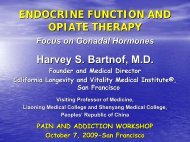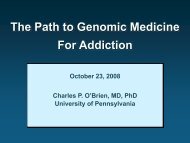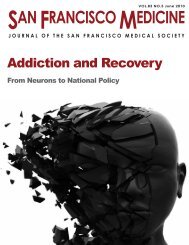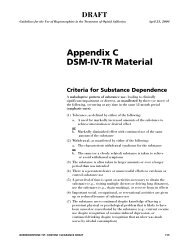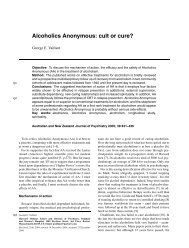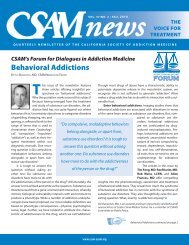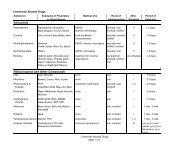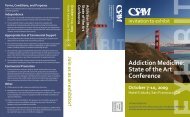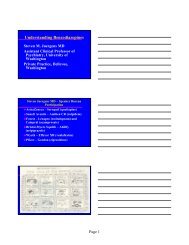CAGE, AUDIT, DAST - California Society of Addiction Medicine
CAGE, AUDIT, DAST - California Society of Addiction Medicine
CAGE, AUDIT, DAST - California Society of Addiction Medicine
Create successful ePaper yourself
Turn your PDF publications into a flip-book with our unique Google optimized e-Paper software.
The <strong>AUDIT</strong>-C is scored on a scale <strong>of</strong> 0-12 (scores <strong>of</strong> 0 reflect no alcohol use). In men, a score <strong>of</strong> 4 or<br />
more is considered positive; in women, a score <strong>of</strong> 3 or more is considered positive. Generally, the higher<br />
the <strong>AUDIT</strong>-C score, the more likely it is that the patient’s drinking is affecting his/her health and safety.<br />
2. What does a positive <strong>AUDIT</strong>-C score mean?<br />
A positive score means the patient has a higher likelihood for at risk drinking or active alcohol<br />
abuse or dependence.<br />
3. Why don’t we use the <strong>CAGE</strong> anymore?<br />
The <strong>CAGE</strong> fails to identify many patients with at risk drinking who are not alcohol dependent.[2]<br />
It is important to identify at risk drinkers because they may also benefit from advice from primary care<br />
providers about their drinking.[3]<br />
4. What is at risk drinking?<br />
At risk drinking is drinking above recommended limits that increases a patient’s risk <strong>of</strong> injury<br />
and/or medical problems. Most patients who report at risk drinking are not alcohol dependent. However,<br />
there are so many <strong>of</strong> these non-dependent, at risk drinkers that they account for most <strong>of</strong> the morbidity and<br />
mortality that is attributed to drinking.[4]<br />
5. If a patient screens positive on the <strong>AUDIT</strong>-C, is it likely they are alcohol<br />
dependent?<br />
Most patients who screen positive on the <strong>AUDIT</strong>-C will be at risk drinkers who are not alcohol<br />
dependent. By using both the <strong>AUDIT</strong>-C score, and the patient’s history <strong>of</strong> alcohol treatment, it is<br />
possible to identify those most likely to be alcohol dependent. For patients who have never been in<br />
alcohol treatment (or attended AA), scores > 8 are associated with relatively high rates <strong>of</strong> dependence.<br />
Patients who have had past alcohol treatment are at high risk <strong>of</strong> dependence with any positive <strong>AUDIT</strong>-C<br />
score.<br />
6. What is appropriate follow-up for a positive <strong>AUDIT</strong>-C screen?<br />
See recommendations under Interpretation/Follow-up <strong>of</strong> <strong>AUDIT</strong>-C Scores.<br />
7. Does everyone who screens positive on the <strong>AUDIT</strong>-C need a full assessment<br />
or referral?<br />
Not everyone needs a full assessment or referral. Since the <strong>AUDIT</strong>-C reflects severity, the raw<br />
score can be used to assess the likelihood that the patient has alcohol dependence. For patients with<br />
<strong>AUDIT</strong>-C scores 4-7 and no prior alcohol treatment, the provider should <strong>of</strong>fer a brief intervention as<br />
follows:<br />
1). Express concern about the patient’s drinking, if drinking above recommended limits;<br />
2) Provide feedback linking the patient’s drinking to his/her health concerns, noting that<br />
patient is drinking above recommended limits, and<br />
3) Offer explicit advice to stay below recommended limits<br />
Patients with more severe problems due to drinking who are do not to accept referral can also be <strong>of</strong>fered<br />
brief intervention. If providers want more information on specific symptoms due to drinking, questions<br />
#4-10 <strong>of</strong> the full <strong>AUDIT</strong> can be used as a brief assessment or patients can be referred to a mental health<br />
specialist.<br />
What is SBIRT? How Do You Do It and Teach It Effectively?<br />
October 7, 2009 / Hotel Kabuki, San Francisco<br />
Resident and Faculty Education <strong>of</strong>fered by the<br />
Medical Education and Research Foundation for the Treatment <strong>of</strong> Alcoholism and Other Drug Dependencies (MERF)<br />
and the <strong>California</strong> <strong>Society</strong> <strong>of</strong> <strong>Addiction</strong> <strong>Medicine</strong> (CSAM)



